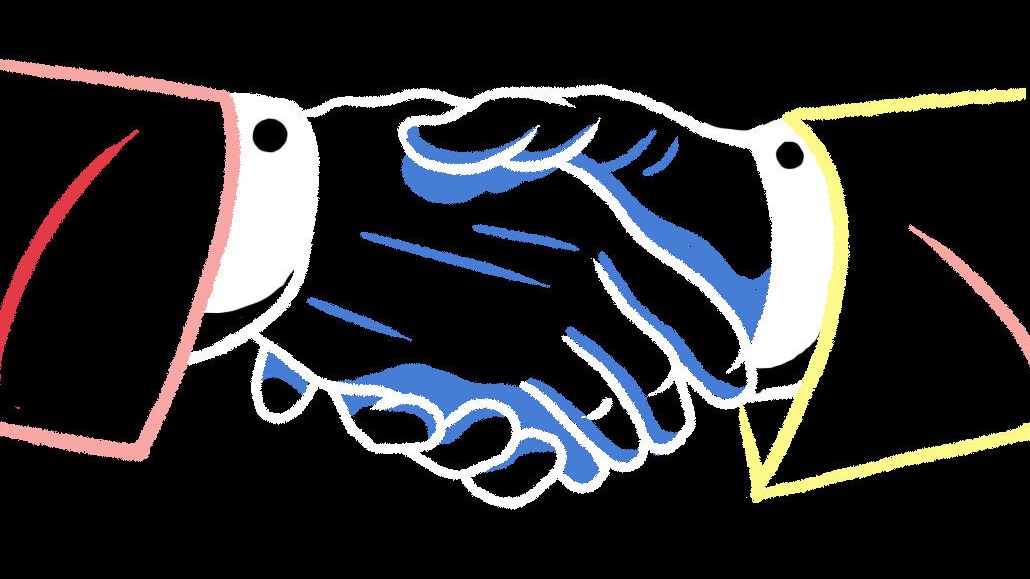
LGBTQ+ publisher Q.Digital has acquired Outsports from Vox Media. The deal was an all-stock equity transaction in which the co-founders of Outsports, which covers LGBTQ-related issues and athletes in sports, will get equity in Q.Digital.
The non-cash transaction means Q.Digital effectively takes over Outsports’ cost of operations and revenue from Vox Media, keeping the team intact. All seven people on the Outsports team have moved to Q.Digital as part of the “acqui-hire” deal, including co-founders Jim Buzinski and Cyd Zeigler and five contributors, said Scott Gatz, CEO of Q.Digital. Outsports officially migrated to Q.Digital on March 4, Buzinski said.
Vox Media acquired 24-year-old Outsports in 2011, and it was the only LGBTQ publication at the company, Buzinski said. When Gatz heard that Vox Media was looking at ways to scale back its portfolio at the end of last year and that the Outsports team was at risk of shuttering, Q.Digital swooped in, he told Digiday.
“In order for Outsports to grow its audience and its business, together we decided that now is the right time for us to find it a new home. We are thrilled with this new partner that directly aligns with their storytelling capabilities and will be a strong fit in terms of the business they’re building,” said a Vox Media spokesperson. They declined to comment on the financial terms of the transaction. “We wanted to set Outsports up either independently or at a new home in order to continue their important work,” the spokesperson added.
Vox Media likely “sees this as a non-core [title], or a business that they haven’t been able to monetize as well as other other parts of their portfolio,” said Sam Thompson, senior managing director at M&A advisory firm Progress Partners. Vox Media’s options were to shut the site down and lay off the team to rightsize the business, or find a new home for Outsports, he said. Vox Media declined to comment on whether or not it was difficult to monetize Outsports, and declined to share Outsports’ 2023 revenue figures.
Q.Digital’s acquisition also means Vox Media doesn’t have to deal with expenses related to severance, Thompson said. Total monthly unique visitors to Outsports totaled 259,000 in January 2024, down 43% from 457,000 in January 2023, according to Comscore data.
“[Q.Digital’s] cost of purchase is essentially running that business,” Thompson said.
Gatz said Q.Digital can afford the additional costs of running Outsports’ business because the company brought in its “best annual revenue ever” in 2023. He declined to share specific figures. “We set aside a budget for expansion in areas where we could accelerate our growth,” he said. Q.Digital’s business model is mostly built off of directly-sold advertising, with 95% of revenue last year coming from direct-sold display advertising, sponsorships, events and custom content, Gatz said.
Buzinski described Outsports as a small publication in a big portfolio under Vox Media, and it will now get more attention with a smaller publisher. (Outsports sat within SB Nation, Vox Media’s network of over 300 sports blogs.) “It was never really a great fit,” Buzinski said. “We were never really a focus of their sales strategy.”
The Vox Media spokesperson said the publisher’s titles have “strong coverage” and opportunities for advertiser investment around LGBTQ+ topics, and that SB Nation will continue to cover LGBTQ+ athletes.
Digiday reached out to three ad agencies and holding companies, but they had not been pitched by Vox Media to advertise on Outsports. “Sports is a passion point for many consumers and also presents role models that increase representation. The intersection of this audience is definitely of interest,” noted one agency executive, who asked to remain anonymous. “Additional exposure and opportunities for business are key to advancing equity in this space.”
Gatz said the plan for Outsports going forward under Q.Digital’s ownership is to increase its unique visitors by 20% year over year — and that all of the Outsports team would have the opportunity to receive cash bonus incentives. Gatz declined to share further details on how this would work.
The plan for increasing Outsports’ audience is to cross-promote traffic from Q.Digital’s other titles (by integrating links and featuring articles on other properties) — a strategy that worked to grow Q.Digital’s publication Into “by 10X” in two years. Outsports, which currently does not have an email strategy, will also launch newsletters soon, Gatz said. Buzinski also predicted a traffic bump from Olympics coverage this summer.
Q.Digital, which owns four other titles, is moving into the sports vertical with this acquisition. Gatz said Q.Digital’s advertisers that have paid for ads around sports content from its sites like the entertainment and pop culture focused Queerty have expressed interest in investing in more sports coverage, especially with the Olympics coming up.
Planet Fitness, for example, will be the first advertiser to sponsor a section on Outsports under Q.Digital’s ownership, Gatz said. Q.Digital will also add Outsports to brands’ run of network buys, he added. The publisher is going to market now with three sports video series and plans to sell sponsorships for Olympics coverage in the summer and Outsports’ Power 100 franchise in the fall.
“It’s been a nice fit in an environment where websites go belly up everyday unfortunately,” Buzinski said.
More in Media

Digiday+ Research: Dow Jones, Business Insider and other publishers on AI-driven search
This report explores how publishers are navigating search as AI reshapes how people access information and how publishers monetize content.

In Graphic Detail: AI licensing deals, protection measures aren’t slowing web scraping
AI bots are increasingly mining publisher content, with new data showing publishers are losing the traffic battle even as demand grows.

In Graphic Detail: The scale of the challenge facing publishers, politicians eager to damage Google’s adland dominance
Last year was a blowout ad revenue year for Google, despite challenges from several quarters.








